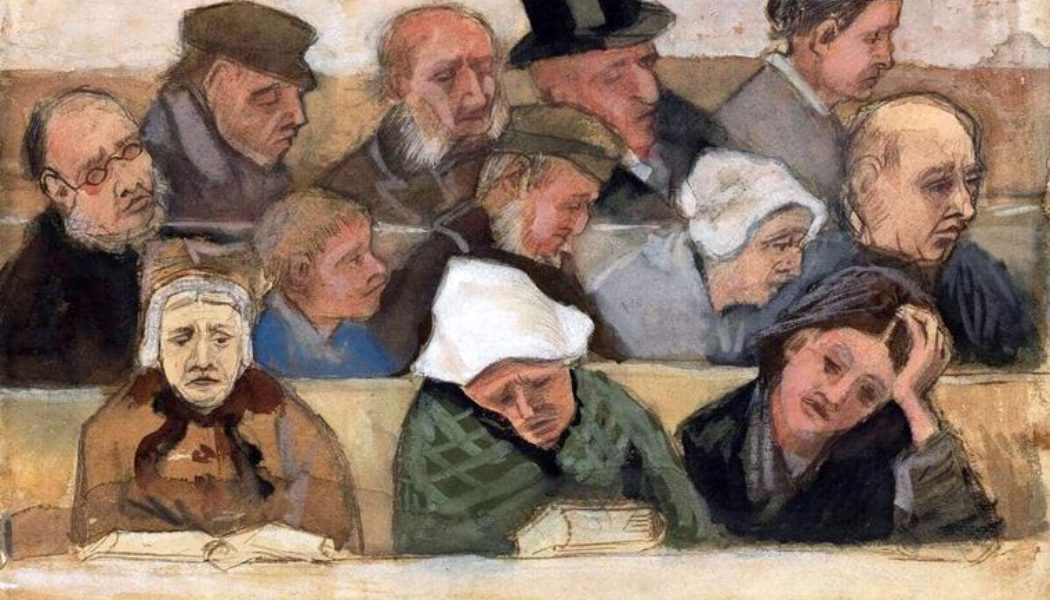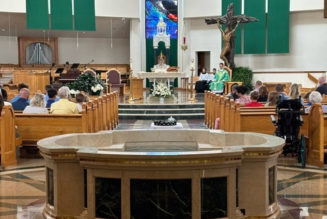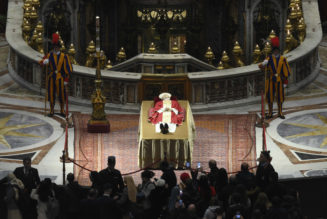
“My dear God, how stupid we people are until You give us something. Even in praying it is You who have to pray in us.” — Flannery O’Connor
As usual, I’m late to a 7 a.m. weekday Mass, and I sneak into the last pew for the Gospel. It’s the one about God knowing every sparrow and counting all our hairs. I figure he must know, then, that I intended to get to church on time. “The Gospel of the Lord. Praise to you, Lord Jesus Christ.” I yawn.
After the homily, Father Andrew launches into the liturgy of the Eucharist, and I’m starting to perk up a bit. The Preface, the Sanctus, and we drop to our knees. During the Canon, I become conscious of an irritation in my left eye — no doubt some leftover sleep crusties had eluded my morning splash of water. Just as I begin to rub it away, Father Andrew leans forward at the altar: “Do this in memory of me.” He raises the consecrated host; the server rings the bell; there’s God himself hovering just ahead, inviting my worship.
“Oh, God, forgive me,” I pray, miserably. “What a mess — totally distracted, fiddling with my face, and there you are.”
What’s the point? I’m not tuned in; I’m not really engaged; I’ve brought little besides my physical presence and rote responses. I’m not even close to what Romano Guardini would consider a bare minimum. “To participate in the Liturgy seriously we must be mentally composed,” he writes. “We must be able to say honestly: ‘Now I am here. I have only one thing to do — participate with my whole being in the only thing that counts, the sacred celebration. I am entirely ready.”
In contrast, this day, here’s what I can say honestly: “I’ll be right with you, God, as soon as I clear the irritation in my eye.” Monsignor Guardini shakes his head in disgust.
And then it hits me: What I just muttered internally was in fact a prayer. I was indeed turned to God and addressing him (although admittedly with a measure of cheek). I might’ve been late and harried when I plopped down in the pew, but I’m still here, in God’s presence, basking in the liturgy, telling him what’s on my heart — even if it’s merely grousing about my human frailties. And I’m contrite, and I’m hungry for the Eucharist. Isn’t it better I’m here, distracted and rubbing my face, than not being here at all? It’s a starting point, an opportunity, and my feeble Godward thoughts incline me in the direction of Guardini’s liturgical composure.
Let’s face it: God is shameless, and he goes to wild lengths to draw us to himself. He coaxes and cajoles, pursues and persuades — hounding, hounding, hounding us to heaven. He’ll even use my fleeting lapse of liturgical decorum. It’s embarrassing, really, and it almost does generate some sympathy for the devil: We don’t really know why Lucifer rebelled against God, but the most common take is that he just couldn’t abide the Father’s extravagant love for finite, crusty-eyed man — a love that would lead to the Incarnation and our redemption.
And it’s the Incarnation that gives me hope, for it means that the Lord has some direct knowledge of what we’re up against as humans. As Father Ian Ker writes, God took on “all that is part and parcel of being a human person” — short of sin, of course, but sin isn’t really human anyway. We were created in God’s image, after all, and our sin distorts rather than defines our nature.
Still, that leaves plenty of room for humdrum mutability. “As spirits [humans] belong to the eternal world, but as animals they inhabit time,” C.S. Lewis’s devilish Screwtape explains. “This means that while their spirit can be directed to an eternal object, their bodies, passions, and imaginations are in continual change.”
Why wouldn’t that be true for the God-man? Like when the boy Jesus lost track of time bantering with the elders in Jerusalem — no sin there. Similarly, I can envision that boy fidgeting in synagogue on a warm Sabbath — a possibility that can inform how we ourselves respond to rambunctious little ones in the pew. And how about a Jesus who nods off during a lengthy reading from Isaiah? When his mom jostles him awake, might he reach up to rub away the grit before turning his attention again to worship?
The key here is not to be distracted by our all-too-human distractions when we’re at Mass or prayer. There’s no moral failing in attending to sensory inputs like irritated eyes, nor is there any fault in wandering thoughts or diverted devotion — and they’re not worthy of scrupulous fixation. “To set about hunting down distractions would be to fall into their trap,” the Catechism reads, “when all that is necessary is to turn back to our heart” (2729). There’s a humility in this, and an opportunity: We get distracted; we acknowledge our distraction; we refocus on God; repeat.
“Therein lies the battle,” the Catechism continues, “the choice of which master to serve.” Therein also lies the irony, for if we keep choosing and turning to him, he does all the work. “We do not know how to pray as we ought,” St. Paul writes the Romans, “but the Spirit himself intercedes for us with sighs too deep for words.” We demonstrate our choice for God by putting ourselves in proximity to him — temporally, spiritually, liturgically — and, just like soldiers going into battle, we shouldn’t be hindered by our lack of preparedness. He’ll fill in the gaps and, in so doing, he’ll nudge us in the direction of cultivating the composure that will make our prayer all the more fruitful in the future.
In my case, that means resolving to get up five minutes earlier next time I go to early morning Mass — and maybe adding a second splash of water on my face.









